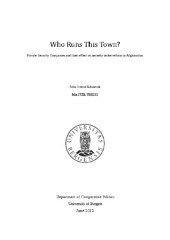Who Runs This Town? Private Security Companies and their effect on security sector reform in Afghanistan
Master thesis
Permanent lenke
https://hdl.handle.net/1956/6040Utgivelsesdato
2012-06-04Metadata
Vis full innførselSamlinger
Sammendrag
Security is a public good that is cheap to maintain in a stable system, but expensive to establish once it has been lost. Internally armed conflicts and civil war are detrimental to public security. Afghanistan has endured three decades of civil war which left its public security sector in shambles. Since 2002, there has been a national process of security sector reform, but it is far from complete, and the extensive use of private security companies, militias and other non-statutory forces pose a problem for the fragile state. This thesis aims to explore how the use of private security companies affects security sector reform, giving special consideration to the state monopoly on the legitimate use of coercive force. It also questions how this, in turn, affects the legitimacy of the government of Afghanistan in the eyes of its population. The research has been conducted as a single-case study based on a series of qualitative interviews combined with information from secondary sources. The theoretical framework for the thesis was established through a review of relevant literature on security sector reform and private security companies. The findings suggest that private security companies and local companies in particular, may have negative effects on security sector reform and government legitimacy, including the monopoly on coercive force. However, these effects would likely prevail despite the lack of a private security market, as they are linked to the warlords and commanders controlling these companies.
